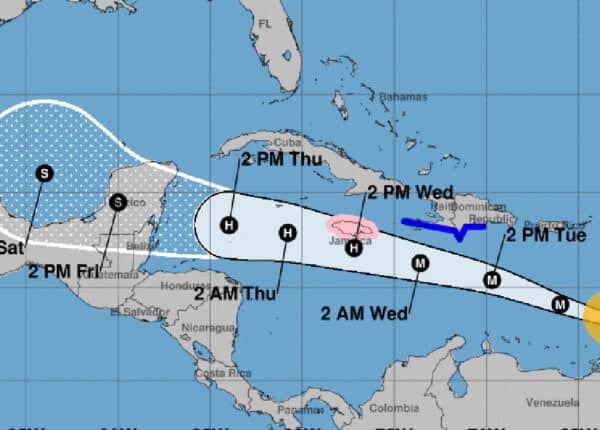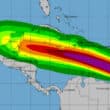Above: Grenada (CJ Photo)
By the Caribbean Journal staff
Grenada’s government will undertake a “comprehensive and collaborative restructuring of its public debt, it announced this weekend.
The government said “circumstances have forced” the move, which will include its US and Eastern Caribbean-denominated bonds due in 2025.
“The Grenadian economy has been severely affected by the global financial crisis and — despite a debt restructuring in 2005 and the reforms implemented over the last five years under IMF-supported programmes — has been unable fully to recover from the devastation wrought by hurricanes Ivan and Emily in 2004 and 2005, respectively,” the government said in a statement.
Grenada’s economy grew by just 0.2 percent in 2012 under the former government of Prime Minister Tillman Thomas, according to data from the United Nations Economic Commission for Latin America and the Caribbean.
It had been projected to grow by 1.2 percent in 2013.
Grenada missed a coupon payment on its bond due in 2025 in September, eventually making the payment just before the expiry of its grace period by borrowing $4.4 million.
“With further borrowing no longer a viable option, Grenada confirmed today that it will not have the resources to pay the coupons that fall due on its U.S. Dollar and E.C. Dollar Bonds due 2025 on 15 March 2013,” it said. “Moreover, the Government does not expect to have the funds to do so within the relevant grace periods.”
Both the US Dollar and EC Dollar Bonds are based on step-up coupon structures. The coupons increased from 2.5 percent to 4.5 percent in September 2011, and are scheduled to step up again, to 6.0 percent, in September 2013.
Further step-ups are scheduled for 2015 and 2017, with the final step- ups, to 9 percent, scheduled to take place in September 2018.
Grenada’s recovery from the devastating impact of hurricanes Ivan and Emily was set back by the onset of the global financial crisis, with a struggling economy
seeing annual contractions in the range of -1.2 percent.
By way of comparison, the government said, “the annual growth assumption that underpinned Grenada’s 2005 debt restructuring (a restructuring that involved no haircut to the principal of the debt stock) was 4.7 percent per annum.”
The restructuring plans marked the first major announcement by the government of Prime Minister Dr Keith Mitchell, whose New National Party swept the country’s elections on Feb. 19, winning all 15 seats contested.
“The global financial crisis has taken a heavy toll on the country, and aggravated the severe debt overhang that continues to weigh down our economy,” said Mitchell, who is also the country’s Finance Minister. “It is now time for Grenada to confront the fact that it cannot continue to pay its debts on current terms, and that the restoration of growth requires the debt overhang to be resolved. We need a fresh start, and it is therefore imperative that we approach our creditors promptly to discuss an orderly restructuring of our liabilities.”
The government said it would soon begin initiating contacts with creditors, including holders of its 2025 bonds and their trustees.
Grenada’s Treasury Bills on the Regional Government Securities Market will not be affected, however, it said.







